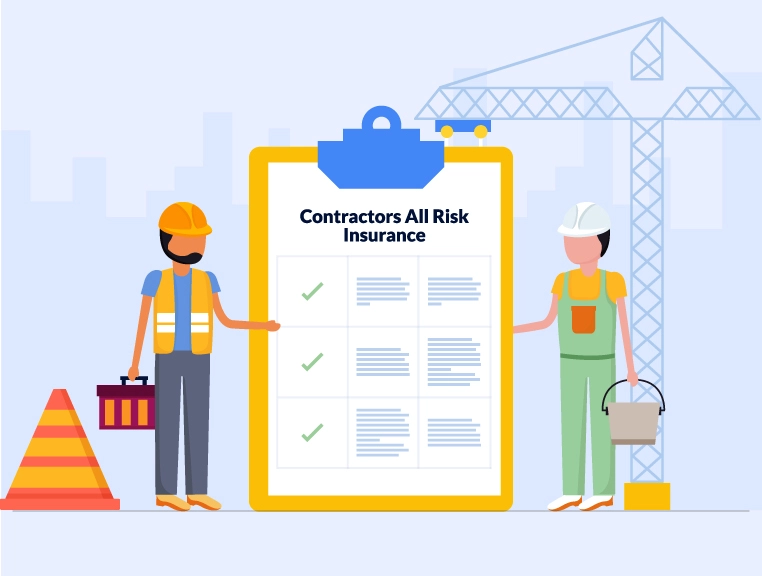Contractors All-Risk Policy
Civil engineering projects involve heavy financial investments in labour, raw materials, and equipment. These businesses face various risks related to weather, site conditions, and human factors. These risks affect workers and third parties such as the surrounding public and neighbors. Every civil engineering project comes with its own set of risks and challenges. This includes inherent risks, involvement of substantial investments, expensive equipment, and challenges related to complex processes. Hence, it is important to have adequate insurance to cover the liabilities that may arise from various risks. Contractor all risk policy plays a crucial role by providing financial protection and reducing uncertainties.
What is the contractor all risk policy?
A contractor all-risk insurance is a type of insurance that gives coverage for physical damage to a construction project and third-party liabilities arising from construction activities. This type of contractor all-risk policy is designed to protect contractors, builders, and construction companies from a wide range of risks that may occur during the construction process.
Here are the key elements of the contractor all-risk policy:
-
Comprehensive coverage
Contractor all-risk insurance in civil construction provides comprehensive coverage. This includes coverage for such loss arising from physical damage to the insured project. The coverage includes the materials, construction works, and equipment. It can also cover damage to temporary structures, and site offices.
The policy includes third-party liability coverage. This gives protection against claims for property damage or bodily injury caused to third parties during the construction process.
All risk policy may provide coverage for liability assumed by the insured under the construction contract. This includes damages or penalties for delays in completion.
-
Premium in Contractor All Risk Policy
Contractor all risk policy tariff is influenced by factors such as the project location, duration of construction, project size, the contractor’s experience, and the limit of coverage. Contractor all-risk policy buying online is an effective way to get comprehensive coverage at a reasonable rate of premium.
-
Additional coverage and benefits
All-risk policy for contractors can also provide add-ons or extensive coverage options depending on the insurer and the type of policy chosen. This includes coverage for damage to construction plants and equipment, advance loss of profits, and professional fees. This policy can also be tailored to specific construction projects. The coverage duration usually matches the construction period and may include a maintenance period after completion.
-
Deductibles and excess clauses
There will also be limits on the maximum amount the insurer will pay for various types of losses. As per the deductibles clause or the contractor all-risk policy excess clause, the insured must bear the minimum amount of loss, and the remaining amount is borne by the insurance company.
Top reasons for civil engineering projects to opt for contractor all risk policy
Contractor all risk insurance plays a crucial role in civil engineering projects for several reasons. Let us look at the reasons:
-
Financial protection
Contractor all risk policy protects civil engineering projects against the liabilities arising from unexpected events such as theft, vandalism, fire, flood, or natural disasters. These unexpected events can cause physical loss or damage to the construction works, structures, materials, and essential tools. Further, having adequate insurance offers financial protection in these times of need and helps the owner to continue the work without significant interruptions.
-
Risk management
The policy helps a contractors to manage the financial consequences of the risk involved. This includes the penalties and additional costs incurred due to construction delays. The policy compensates for the penalties and additional costs when the construction is delayed because of an insured event. Contractor policy covers a wide range of risks associated with civil engineering projects.
-
Customisation
Contractors all risk policies can be customised as per the specific needs of a civil engineering project. Moreover, this flexibility allows contractors to address unique risks associated with different types of projects, construction methods, timelines, and locations.
-
Contractual requirement
Many times, construction contracts can require or demand the need of having a all-risk policy. Further, to adhere to the specific needs of the projects, it is important to have the insurance cover and comply with this contractual obligation.
Conclusion
To sum up, the contractor all-risk policy is crucial in civil engineering projects to mitigate financial risks, comply with contractual requirements, and ensure the smooth progression of construction activities. Moreover, it is a valuable risk management tool in the construction industry that protects against various unforeseen events.



